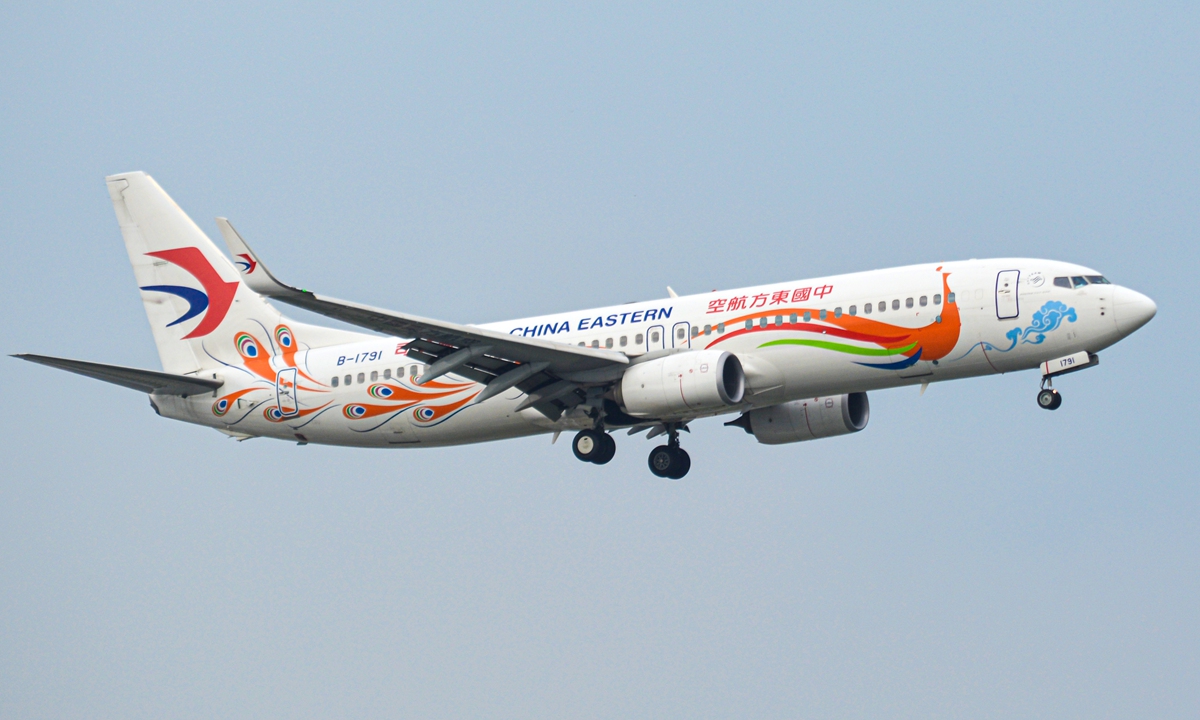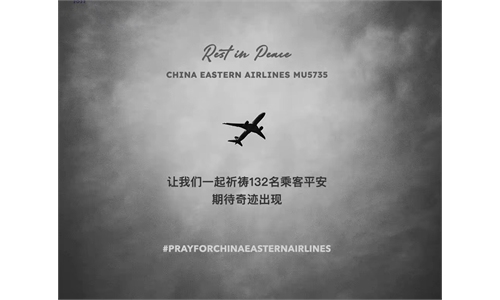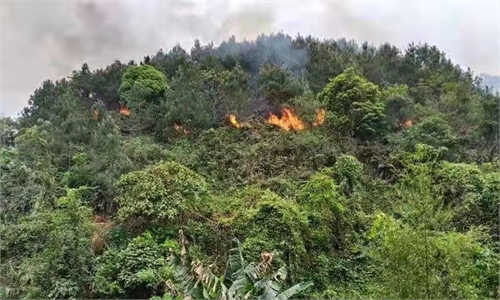
A China Eastern Boeing 737 aircraft File photo: VCG
Click here to stay tuned with our live updates on plane crash in Guangxi
China's civil aviation sector is taking multiple concrete measures to beef up flight safety after a China Eastern Airlines Boeing 737 with 132 people on board crashed Monday afternoon, as experts warned of a short-term impact from fear of air travel could further dent the sector, already one of the worst-hit by the COVID-19 epidemic.
As a swift reaction to Monday's accident, airlines beefed up flight safety, following the Civil Aviation Administration of China (CAAC)'s order to strengthen aviation safety measures including stronger leadership in safety work, enhanced risk prevention and control, strictly enforcing regulations and operational standards, and fulfilling safety supervision responsibilities.
The CAAC ordered the industry to immediately carry out a 2-week industry safety inspection, aiming to strengthen scrutiny over potential hazards and ensure the safety of aviation operations and people's lives.
Sources from a major carrier in China told the Global Times on Tuesday that airlines have also been optimizing the deployment of the crew, and airlines are taking measures to alleviate the psychological stress of crew members in the wake of the accident.
China Eastern is also boosting its cockpit safety redundancy, according to domestic news portal thepaper.cn, citing multiple sources from the company. The new rule mandates three experienced pilots, instead of two, to carry out a flight.
Wang Yanan, chief editor of Beijing-based Aerospace Knowledge magazine, told the Global Times on Tuesday that putting experienced tutor-level pilots inside the cockpit will increase their ability to handle emergencies during a flight.
"At a time when the public is turning their attention to flight safety, such a move is necessary," Wang said.
CAAC, China's civil aviation regulator, activated its emergency response mechanism upon receiving reports of the accident on Monday and called for an investigation on potential safety hazards after the crash.
On Monday evening, China Eastern refuted rumors online that the accident could be caused by the company's efforts to cut repair and maintenance costs, saying such a claim as "false," according to the People's Daily. The airline's financial report showed that its repair cost in 2021 was 12 percent more than that of 2019.
However, industry experts said although the accident ended China's safety record, it could not break the stringent safety protocol formed in a decades-long progress and aviation safety can be ensured. With China's safe flight day record being reset to zero following Monday's accident, experts urged the general public to regain confidence in air travel as confidence is more valuable than gold for a sector already reeling from the economic onslaught of the coronavirus.
As of February 19, 2022, the continuous safe flight time of China's civil aviation had exceeded 100 million hours, the best safety performance in the history of China's civil aviation industry and the best continuous safe flight record in the history of civil aviation worldwide, according to the official website of CAAC.
"The reason for maintaining such a safety level for 10 or 20 years is that there are effective flying procedures and norms and the entire operating system is of high standard," Zheng Hongfeng, CEO of VariFlight, told the Global Times on Tuesday.
Monday's accident ended Chinese civil aviation's flight safety record at 4,227 days, the world's longest, but cancellations rose on Tuesday.
Nearly 70 percent of the 11,800 flights scheduled for Tuesday were canceled in advance, though an industry source told the Global Times that the high number of cancellations is not unique to Tuesday as has been the case in the recent round of epidemic.
However, a Bloomberg report still said Tuesday's rate of cancellation doubles what was recorded in early March.
Of the 23 Chinese airlines with B737-800s with 853 planned passengers flights on Tuesday, three airlines affiliated with China Eastern grounded their B737-800s, information provider flymaster told the Global Times on Tuesday. Domestic financial news portal Caixin reported that planes grounded by China Eastern on Tuesday numbered at over 200.
In a chain reaction to Monday's accident, The New York Times reported that "the crash of a Boeing 737-800 NG in China on Monday is the latest crisis for the American plane manufacturer, raising the prospect of renewed regulatory scrutiny while the cause remains unknown."
Repercussions
Concerns rose over the health of the aviation sector now facing the double shock of the fatal accident and epidemic, driving shares down on Monday.
At market's close on Tuesday, 15 aviation shares on the A-share market recorded an average loss of 0.98 percent. China Eastern fell by 6.15 percent.
Market watchers are concerned the crash will cast a shadow on the industry's development.
The number of domestic flights has dropped to about 50 percent of the 2019 level brought by the epidemic, and the crash has placed further pressure on the industry.
"The accident has made everyone feel very sad, after all, Chinese civil aviation has always had a good reputation for safety in the world," market watcher Wang Jiangmin told the Global Times on Tuesday.
China's civil aviation market has relied primarily on domestic flights since 2020 due to restrictions on international travel amid the pandemic.
Two rounds of epidemic flare-ups in the second half of 2021 hit the industry hard, and the passenger volumes of China's top three airliners were down 40 percent from their 2019 levels.
In the first two months of 2021, the industry incurred a loss of 22.2 billion yuan, according to media reports.
The industry was so weak that it was identified by the Chinese government as one of the worst-hit industries since the epidemic in 2020.
Among 43 supportive policies issued in February by the State Council to shore up industries bearing the brunt of the epidemic's economic onslaught, five policies including the suspension by airlines of the prepaid value-added tax were issued specifically for the civil aviation industry.
The crash may hit air travel in the short term, and it will take time for the public to recover their confidence in air travel, and the industry needs to take practical actions to restore confidence and balance various tasks, Xiong Wei, another market watcher told the Global Times.





